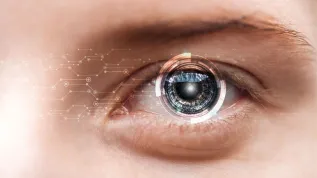
The lack of antibodies against the nucleocapsid protein of the SARS-CoV-2 virus doubled the risk of the so-called long COVID, an inter-university team of Polish scientists found. This discovery, which requires further confirmation, could potentially open new avenues for the prevention and treatment of this disorder.
According to the WHO definition, long COVID is diagnosed when the following conditions are met: three months after infection with the SARS-CoV-2 virus, the patient still has at least one symptom; this symptom has persisted for at least two months; it is impossible to explain it in any other way than with the past infection.
'We know that this phenomenon may affect more than 10 percent of those infected with SARS-CoV-2. We are talking about a huge number of people and costs, considering the scale of the spread of this virus in the human population. Unfortunately, we still do not have established therapeutic procedures', says Dr. Piotr Rzymski from the Poznan University of Medical Sciences, one of the authors of the study, the results of which were presented a few days ago at ESCMID Global in Barcelona (Spain) - the largest and most prestigious congress devoted to microbiology and infectious diseases.
Together with colleagues from several other Polish universities (Medical University of Silesia, Jan Kochanowski University in Kielce, Medical University of Białystok), Dr. Rzymski conducted a study aimed at determining possible causes of the development of long COVID. The experts wanted to better understand the relationship between the adaptive immune response to SARS-CoV-2 infection and long-lasting symptoms of infection.
'Long COVID is an intriguing phenomenon, but it is not easy to study', says Dr. Rzymski. 'Its etiology and the profile of accompanying symptoms are complex. It is actually a constellation of various conditions with a common cause, which is the transmission of SARS-CoV-2 infection'.
Research carried out so far indicates that long COVID may be caused by dysregulation of the immune system's response, chronic inflammation, autoimmune processes, reactivation of dormant viruses, coagulation disorders or incorrect production of selected neurotransmitters. Some scientific reports suggest that in some patients it may be the result of prolonged presence of the virus or its proteins in selected locations of the body. 'Such a phenomenon could be facilitated by impaired production of antibodies against SARS-CoV-2. So we decided to check how it looked in our group of patients', says Dr. Rzymski.
He adds that there is another problem with the long COVID research: most scientists analyse it is based only on the symptoms reported by patients, which increases the risk of overestimating the phenomenon. 'Therefore, in our study, we objectified it by using recognized laboratory and biochemical parameters', the researcher says.
The scientists gathered a group of 200 people who had their first ever SARS-CoV-2 infection and were not vaccinated. People reporting persistent symptoms for a minimum of three months after infection (and not having had them before infection) underwent very extensive biochemical and clinical tests.
'Long COVID is an intriguing phenomenon, but it is not easy to study', says Dr. Rzymski. 'Its etiology and the profile of accompanying symptoms are complex. It is actually a constellation of various conditions with a common cause, which is the transmission of SARS-CoV-2 infection'.
Based on the results, the scientists distinguished three long COVID phenotypes: respiratory, cardiac and psychiatric. Dr. Rzymski adds that all study participants reported symptoms that - as it later turned out - correlated with the results of their laboratory and clinical tests. 'So these people cannot be accused of faking long COVID. And they sometimes do hear such insinuations from their relatives, employers and even some doctors', he says.
The antibody profile against SARS-CoV-2 was also examined in patients. It turned out that participants with long COVID had a significantly lower levels of anti-nucleocapsid IgG antibodies. Their absence independently doubled the risk of developing long COVID.
'This is an important observation because one of the long COVID etiology hypotheses assumes a prolonged presence of SARS-CoV-2 virus antigens in the body', says Dr. Rzymski. 'Meanwhile, the lack of these antibodies increases the chance of prolonging this presence'.
The expert explains that nucleocapsid is a viral protein that can disrupt various pathways in cells, promote inflammation and impair the action of interferons - molecules that play an important antiviral role. The lack of production of antibodies against it may potentially lead to prolonged harmfulness of this protein and, as a result, favour the development of long COVID.
'This, of course, requires further testing, but it potentially opens therapeutic or preventive paths. Please note that the vaccines authorized in Europe use the virus's spike protein as an antigen. Research shows that their use reduces the risk of long COVID, although this effect is not very spectacular. What if we thought about preparations that, in addition to stimulating the production of antibodies against the spike protein, would also cause the production of anti-nucleocapsid antibodies? There are several such promising projects. It would be interesting to check whether, through a broader immunisation profile, they could also provide better protection against long COVID', Rzymski says. (PAP)
PAP - Science in Poland, Katarzyna Czechowicz
kap/ agt/ js/
tr. RL













